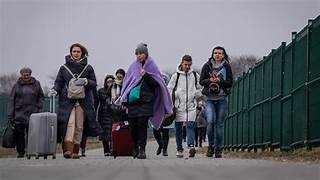The German government plans to establish a mechanism for redistributing Ukrainian immigrants across European Union countries and reducing their numbers in Germany due to the strain on social services. This includes considering the return of fighting-age Ukrainians to Ukraine, despite the risks they face. Germany has received 1.152 million Ukrainian refugees, the highest in Europe, attracted by its generous social benefits. These refugees receive immediate citizenship benefits, unlike other asylum seekers who wait up to nine months.
This measure is followed by an economic slowdown exacerbated by the Russia-Ukraine war. Germany’s reliance on Russian gas worsened the situation when the Nord Stream Pipeline was disrupted, leading to electricity production challenges in its heavily industrialized economy.
The German economy, heavily dependent on its industrial sector, has been significantly affected by the war, making it difficult to maintain government expenditure and fund social welfare programs. The influx of Ukrainian refugees has further strained resources. Returning some Ukrainians to Ukraine addresses the economic burden while maintaining Germany’s international support for Ukraine. Chancellor Olaf Scholz supports redistributing refugees within the EU and opposes allowing Ukraine to use German weapons for attacks on Russian territory, aiming to prevent further escalation of the conflict.
Germany set to introduce a new strategy to distribute Ukrainian immigrants across European Union countries and curb the number of new arrivals. This move comes in response to the significant pressure on Germany’s social services caused by the large influx of Ukrainian immigrants. As part of this plan, Berlin is considering returning fighting-age Ukrainians to Ukraine, despite the severe risks they face on the front lines.
Germany’s generous social benefits have made it a preferred destination for many Ukrainians. The country has taken in 1.152 million Ukrainian refugees, more than any other European nation. In comparison, Poland has received around 956,000, Italy about 172,500, and France approximately 68,800. Ukrainian refugees in Germany are granted citizenship benefits immediately upon arrival, a stark contrast to other asylum seekers who typically wait around nine months.
These refugees receive a monthly benefit of €563, higher than what is provided by other EU countries. Additionally, the unemployment rate among Ukrainian refugees in Germany is roughly 20%, lower than in other EU nations.
Christian Engelhardt, administrator of the Bergstrasse district, stated that localities are at their limit and called for an end to granting immediate benefits to Ukrainian refugees. He highlighted that cities and municipalities have been overwhelmed by the need to accommodate refugees for months. Engelhardt demands that Ukrainian refugees should not automatically receive citizen benefits.
German Chancellor Olaf Scholz supports the idea of distributing refugees within the EU and addressing secondary migration. A spokesperson for the country’s Interior Ministry confirmed Scholz’s strong support for a solidarity distribution for refugees, emphasizing the need to resolve secondary migration within the EU.
Scholz’s patience with Ukraine appears to be waning. He has reiterated his opposition to revising the rules on Ukraine’s use of German weapons and refuses to authorize Kiev to attack Russian territory with these weapons. Scholz emphasized that the existing rules regarding German weapons were negotiated with Ukraine and are effective.
The German Chancellor reiterated that the objective of German policy is to prevent the conflict in Ukraine from escalating into a major war. This stance aligns with NATO Secretary General Jens Stoltenberg’s recent call for allowing Ukraine to use Western-supplied long-range missile systems against Russia. However, Russian Foreign Minister Sergei Lavrov interpreted Stoltenberg’s request as a sign of desperation.
Germany’s economy has been heavily impacted by sanctions on Russia and support for Ukraine, as highlighted by the German Chamber of Commerce and Industry (DIHK). On May 23, the DIHK reported that the EU’s largest economy is struggling, based on a survey of over 24,000 companies from various sectors and regions. DIHK managing director Martin Wansleben noted negative business expectations and worsening conditions in the industry, explaining Scholz’s push to redistribute Ukrainian refugees and alleviate the strain on social services.
In conclusion, Germany’s initiative to share Ukrainian immigrants across EU countries is a response to the mounting pressure on its social services and economy. This approach reflects the need for a coordinated European response to the refugee crisis while addressing the internal challenges faced by Germany.







